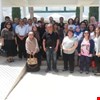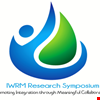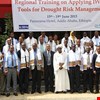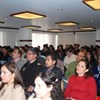

JetBlue is offering two (2) scholarships for the recipients to attend as observers, the first-ever “Innovators Think Tank on Climate Change and Coastal Tourism” in the Dominican Republic on July 22nd – 24th, 2015.


Aimed at integrating climate change considerations in water and soil conservation planning in Tunisia, the Global Water Partnership – Mediterranean (GWP-Med) has established, in the framework of its WACDEP Programme (Water, Climate and Development Programme), a very beneficial collaboration with the Department for Planning and Conservation of Agricultural Lands at the Tunisian Ministry of Agriculture and the Regional Department for Agriculture in Bizerte, in Tunisia’s North.


The Water and Sewerage Authority (WASA) of Trinidad and Tobago and the Ministry of the Environment and Water Resources, will host the first-ever Integrated Water Resources Management (IWRM) Research Symposium in Trinidad on July 15th and 16th, 2015 at The University Inn and Conference Centre in St. Augustine.

The Global Water Partnership, Eastern Africa in partnership with the Ethiopian Ministry of Water, Irrigation and Energy, the Nile IWRM-Net/ Cap-Net and Water and Land Resource for Ethiopian Country Water Partnership (WLRC) organized a Regional Training on Drought Risk Management and Integrated Water Resources Management (IWRM) in Addis Ababa, Ethiopia from 15-19 June 2015.
The Government of Malawi, through the Ministry of Agriculture, Irrigation and Water Development assured that the Malawi government is working hard to address the challenges rocking the water sector in the country. Malawi hosted the SADC national week whose focus is on mainstreaming gender in water issues. The event was held from 13-15 May, 2015 at Crossroads Hotel, Lilongwe. The SADC Water Week, held under the theme “From Vision to Action” was attended by delegates from government ministries, civil society and the private sector.

The International Land Coalition (ILC), Global Water Partnership (GWP) and International Water Management Institute (IWMI) has brought together land and water professionals, researchers and policy makers to reflect on the linkages between water and land in the emerging geopolitics of food, and to discuss cases from global, regional, basin, national or local levels, where these linkages were successfully addressed in legal frameworks, policy, and/or practice. The workshop is being held in Pretoria from 15 – 16 June 2015.

Eighty representatives from a diversity of water–related sectors participated in an informative meeting, held on 22 May 2015 in La Paz, to learn about the advantages of establishing a Country Water Partnership (CWP) in Bolivia.